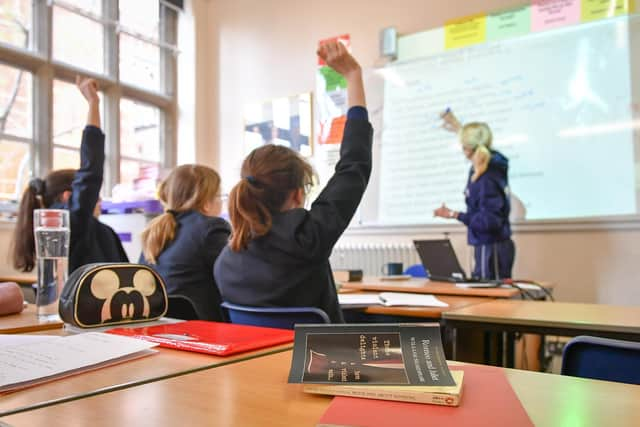The questions around frontier technology such as artificial intelligence that need answering for education - Darren Mundy
For the past 15 years, I’ve been interested in how technologies can be used to strengthen our classrooms.
Technology has always played a role in the development of our educational systems. The technology of pen, printing press, computer, world wide web, and now artificial intelligence, has been and continues to be used to shape and re-shape the ways we develop. These changes in the ways people learn have also often had an impact on access, creating opportunities for different groups of people to learn more and develop further than would have been possible without technology. However, there are challenges.
Advertisement
Hide AdAdvertisement
Hide AdOne area where technology can impact is in enabling all learners to have a voice. There are different reasons preventing students from speaking out in a classroom, including physical disability, cognitive difficulties, shyness and anxiety, as well as the perceptions of others. These factors contribute to reducing the level of inclusivity in our classrooms. Technology can introduce methods for engagement through devices such as tablets, phones and other accessible devices, where increased levels of anonymity can be achieved for learners, reducing some of the barriers. Challenges remain though. For example, there are concerns about technology availability, with not all learners having access to devices, and questions over whether technology-based interaction creates the depth that can be enabled through verbal interaction.


Learner empowerment can also be facilitated through technology. Many web-based organisations have designed systems which reflect our interests, ways of working, and more generally who we are.
The web is estimated to consist of over one billion indexed web pages (those known by search engines). This provides a wealth of materials for individuals to develop their knowledge, giving people more access to information and control of what they view than ever before. However, what people view is often determined by search engine algorithms.
In our organisations, we’ve taken steps to diversify resources presented to learners, but often digital resources are controlled by payment or popularity, or location of the resource. The issues presented by the Cambridge Analytica scandal create concerns over who is controlling the information we’re viewing, who is viewing us, and then in general whose world are we viewing. Effectively are we moving from state-controlled curricula to private enterprise curated materials?
Advertisement
Hide AdAdvertisement
Hide AdIn addition, the control people have can mean they always consume similar content about items of interest to them. This may mean continually engaging with people who share the same views, or always watching cat videos – you make your choice. Our digital platforms are not particularly well designed to generate levels of digital curiosity.
Our own research at the University of Hull working in partnership with colleagues from across Europe within the DETECT project, has explored the importance of developing an understanding of, not just the skills in using various technologies, but also the knowledge of how to apply technology in different situations to support learning, and to think critically about its use and impact. The development of such knowledge is crucial for teachers, particularly in thinking through how to respond to the challenges presented by technology use and how to achieve the most value in improving the experience for all.
For example, recent developments in AI with the creation of tools such as ChatGPT, Jasper AI and others have resulted in headteachers calling developments ‘bewildering’ and expressing alarm that technology ‘is moving too quickly’. Whilst there are clear concerns, there are many opportunities that could be enriching and it is good to see the Department for Education providing guidance and practical skills development. AI has the potential to go further than personalising our learning materials, it can help individuals gain a deeper understanding of what they are doing wrong and how to correct it, and can help broaden our understanding of the world including our relationship to it.
Whilst pandemic lockdowns created a need to shift towards greater use of technologies to support learning than ever before, many of the challenges remain. Universities have a key role in continuing to work with policymakers and our partner schools and colleges in exploring how to embed existing and new technologies to support our curriculum.
Professor Darren Mundy is Dean of the Faculty of Arts, Cultures and Education at the University of Hull.
Comment Guidelines
National World encourages reader discussion on our stories. User feedback, insights and back-and-forth exchanges add a rich layer of context to reporting. Please review our Community Guidelines before commenting.